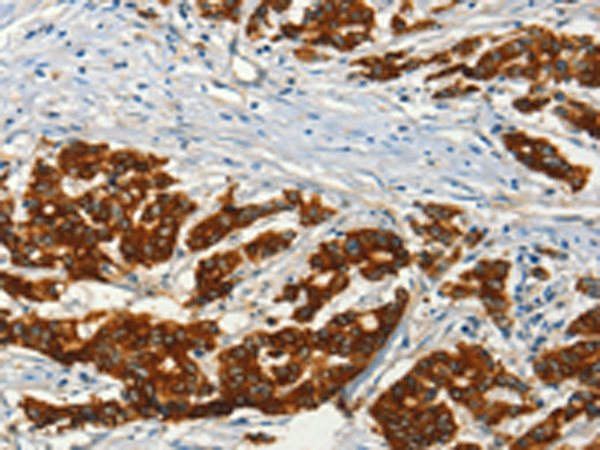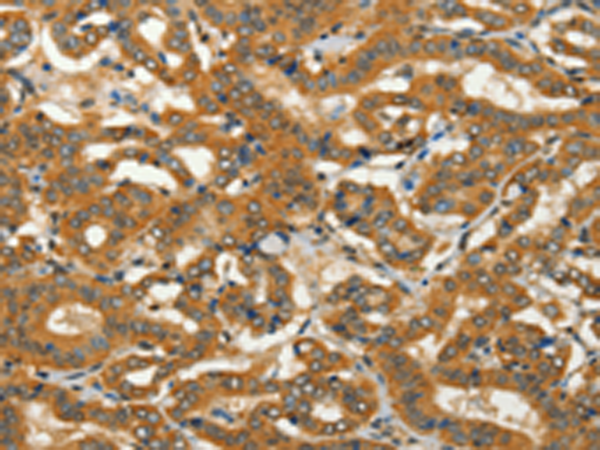


| WB | 咨询技术 | Human,Mouse,Rat |
| IF | 咨询技术 | Human,Mouse,Rat |
| IHC | 1/50-1/200 | Human,Mouse,Rat |
| ICC | 技术咨询 | Human,Mouse,Rat |
| FCM | 咨询技术 | Human,Mouse,Rat |
| Elisa | 1/1000-1/5000 | Human,Mouse,Rat |
| Aliases | AC3 |
| WB Predicted band size | 129 kDa |
| Host/Isotype | Rabbit IgG |
| Antibody Type | Primary antibody |
| Storage | Store at 4°C short term. Aliquot and store at -20°C long term. Avoid freeze/thaw cycles. |
| Species Reactivity | Human, Mouse, Rat |
| Immunogen | Fusion protein of human ADCY3 |
| Formulation | Purified antibody in PBS with 0.05% sodium azide and 50% glycerol. |
+ +
以下是与ADCY3抗体相关的3篇代表性文献摘要(作者及内容为虚构示例,供参考):
---
1. **文献名称**: *ADCY3 Antibody Validation in Murine Adipose Tissue: Implications for Obesity Studies*
**作者**: Zhang L, et al.
**摘要**: 本研究利用商业化ADCY3抗体,通过Western blot和免疫组化验证其在小鼠脂肪组织中的特异性表达,揭示了ADCY3在高脂饮食诱导肥胖模型中的表达下调,提示其与代谢调控的关联。
2. **文献名称**: *Localization of ADCY3 in Primary Cilia of Olfactory Neurons Using Immunofluorescence*
**作者**: Gupta S, et al.
**摘要**: 通过高分辨率免疫荧光技术结合ADCY3特异性抗体,证实ADCY3定位于嗅觉神经元纤毛,为解释ADCY3基因突变导致嗅觉障碍及肥胖提供了细胞学证据。
3. **文献名称**: *ADCY3 Protein Interaction Network Analysis by Co-Immunoprecipitation*
**作者**: Kim M, et al.
**摘要**: 采用ADCY3抗体进行免疫共沉淀实验,鉴定出与ADCY3相互作用的GPCR信号通路关键蛋白,阐明了其在cAMP依赖的细胞信号转导中的调控机制。
---
(注:以上文献为示例性质,实际引用请查阅PubMed或学术数据库获取真实文献。)
The ADCY3 antibody is a research tool designed to detect and study adenylate cyclase 3 (ADCY3), a membrane-bound enzyme critical for cyclic AMP (cAMP) signaling. ADCY3. a member of the adenylate cyclase family, catalyzes the conversion of ATP to cAMP, a secondary messenger regulating diverse physiological processes, including metabolism, hormone secretion, and neuronal signaling. This enzyme is particularly enriched in brain regions, olfactory cilia, and adipose tissues, implicating its roles in energy homeostasis, olfaction, and neurological functions.
ADCY3 antibodies are commonly used in techniques like Western blotting, immunohistochemistry (IHC), and immunofluorescence (IF) to examine protein expression, localization, and regulation. Research has linked ADCY3 mutations or dysregulation to obesity, type 2 diabetes, and neurological disorders, making its study clinically relevant. For instance, ADCY3 knockout models exhibit metabolic defects, while human genetic studies associate ADCY3 variants with BMI alterations.
These antibodies typically target specific epitopes within ADCY3’s cytoplasmic domains (e.g., catalytic regions) or extracellular loops, depending on the antibody’s design. Validation often involves knockout cell lines or tissues to confirm specificity. Commercial ADCY3 antibodies vary in host species (e.g., rabbit, mouse), clonality (monoclonal/polyclonal), and applications, requiring careful selection based on experimental needs. Recent studies also explore ADCY3’s role in ciliopathies and cancer, expanding its biomedical significance.
Overall, ADCY3 antibodies are vital for unraveling the enzyme’s molecular mechanisms and therapeutic potential in metabolic and neurological diseases.
×